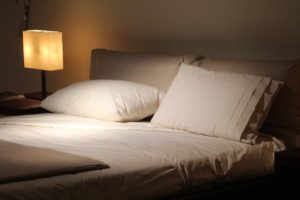Sleep disorders can be both the cause or the result of a wide array of mental health concerns. Insomnia is, by far, the most commonly reported sleep problem, and can point to a number of different disorders. If you find yourself experiencing sleep disturbances on a regular basis, it may be a symptom of an underlying issue.
 Insomnia is the most commonly reported sleep disorder.
Insomnia is the most commonly reported sleep disorder.
Sleep disorders can be especially frustrating for patients, because broken or lacking sleep often exacerbates existing mental or physical health conditions, making the road to recover longer. If you suffer from a sleep disorder, I want to help.
Types of Sleep Disorders
Insomnia – The inability to sleep. Insomniacs may have trouble falling asleep or staying asleep, whether or not they feel sleepy. A diagnosis of insomnia is usually only made if it is an ongoing situation of more than a few weeks.
Sleepwalking – Sleepwalking (or somnambulism) occurs when a person partially rouses from sleep, remaining largely unconscious but often sitting up, walking around, or even talking with other people as though awake. A sleep walking person will almost always perform activities with eyes open, sometimes making it difficult for others to know whether or not they’re really awake.
 Sleepwalkers can perform simple waking activities while still in a dream-like state.
Sleepwalkers can perform simple waking activities while still in a dream-like state.
Oversleeping – Chronic oversleeping is known as hypersomnia. Often dismissed as laziness by friends and family, hypersomnia is often symptomatic of a serious physical condition or mental illness. Narcoleptic people suffer from hypersomnia in the purest sense, but it is most often a symptom of depression.
Night terrors – A person experiencing a night terror will exhibit symptoms of extreme fear (similar to a panic attack), sometimes thrashing, crying out, or sitting upright – all while unconscious. Although there is little definitive knowledge about the cause of night terrors, psychotherapy has been shown to provide relief to those who suffer from them.
Sleep Paralysis – Sufferers of sleep paralysis become conscious before the state of paralysis that the body falls into during sleep has ceased. This leads to feelings of panic, which are intensified by dream-like hallucinations that often accompany episodes. It’s possible that sleep paralysis is influenced by anxiety disorders.
Hypnophobia – The fear of sleep is usually a result of negative sleep experiences, such as repeated night terrors, recurring nightmares, or memories of traumatic events occurring during sleep.
General Fatigue – Daytime fatigue is often a symptom of a sleep disorder, as well as anxiety or depression.
 A psychologist can help you overcome your sleep disorder.
A psychologist can help you overcome your sleep disorder.
As you can see, many types of sleep disorders are psychological in nature or can be treated by psychotherapy. A psychologist can assess your particular situation and help you determine what some of the underlying factors are. For example, a patient suffering from hypnophobia may have experienced sexual abuse while in bed at night, leading to a fear of returning to that situation. Or someone suffering from night terrors may be able to sleep peacefully once they work through the fears that manifest themselves at night.
Sleep is essential for both mental and physical health, so if your sleep is disrupted, don’t wait to seek out help from a trained psychologist. To make an appointment, please contact me today.
